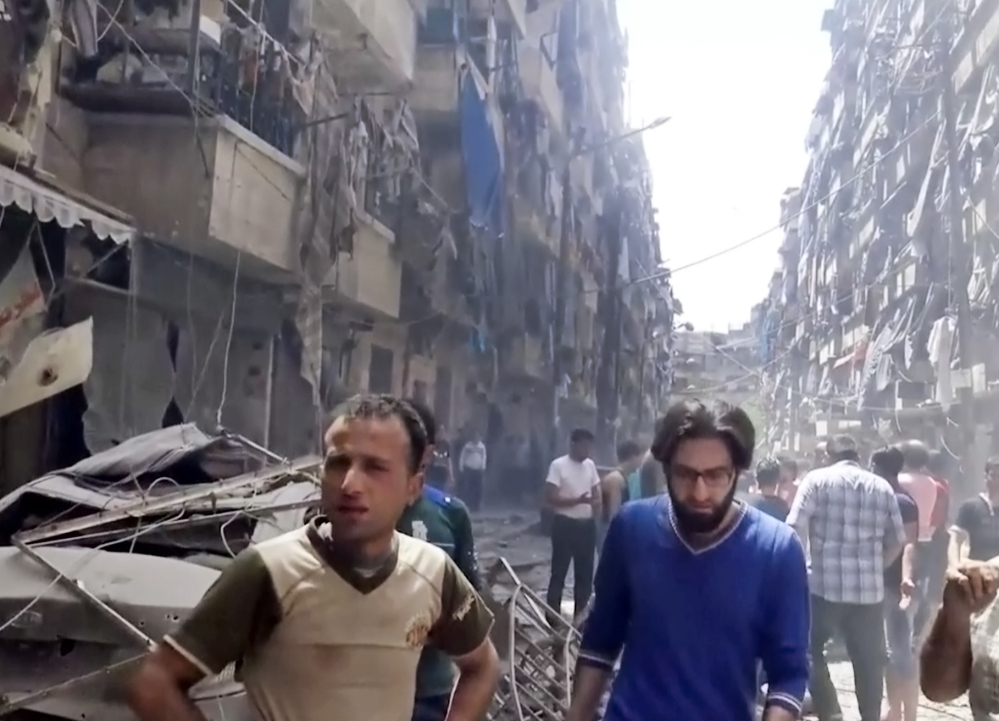DAMASCUS, Syria — The Syrian army and rebels unleashed deadly new attacks on each other Friday in Aleppo, with insurgents shelling a mosque during weekly prayers and government airstrikes hitting opposition neighborhoods in escalating bloodshed the U.N. decried as a “monstrous disregard for civilian lives by all parties.”
More than 200 people have been killed in eight days of mounting violence in and around the contested northern city, including 15 at the Malla Khan mosque hit by rebel rockets and another 10 from the government warplanes and helicopters, officials said.
The surge in fighting has caused the collapse of a two-month cease-fire brokered by the U.S. and Russia. It also has raised fears of an all-out government assault on Aleppo and warnings of a humanitarian disaster in the 5-year-old civil war.
In rebel-held neighborhoods, medical facilities, bakeries and a water station have been pounded by a government bombardment, residents say. Electricity is down to a few hours a week. A single road out of Aleppo is the only supply line for the insurgent-controlled districts, where an estimated 250,000 people remain. If forces loyal to President Bashar Assad take the road, there could be major shortages of food and medicines.
“People have already started fleeing the city,” said Baraa al-Halaby, an activist who watched older men, women and children leave his rebel-held neighborhood Friday. “If Aleppo comes under siege, people will starve to death within a month.”
Assad’s military declared a brief truce in the capital of Damascus and its outskirts and the coastal province of Latakia – but not in Aleppo.
That could signal plans for a ground assault. Pro-Assad media in Lebanon have been reporting for weeks that reinforcements are preparing for the “grand battle of Aleppo.”
Syria’s largest city and its commercial center before the war, Aleppo has been divided between the two camps. Now it is once more the main battleground after peace talks stalled in Geneva.
Zeid Ra’ad Al Hussein, the U.N. High Commissioner for Human Rights, said the latest fighting showed a “monstrous disregard for civilian lives by all parties to the conflict.”
In a statement released in Geneva, Zeid urged the sides to step back from a return to all-out war.
“In short, the violence is soaring back to the levels we saw prior to the cessation of hostilities. There are deeply disturbing reports of military buildups indicating preparations for a lethal escalation,” he said.
Russian Foreign Minister Sergey Lavrov and Secretary of State John Kerry discussed ways to resolve the Syrian conflict through the “preservation and strengthening” of the Feb. 27 cease-fire, the provision of humanitarian assistance to people living in blocked areas and the establishment of a sustainable political process, the Foreign Ministry said in a statement.
Lavrov again stressed the need for the full participation of Syrian Kurds in the talks, as well as for the disengagement of the moderate opposition from groups considered to be terrorist organizations.
State Department spokesman Mark Toner said the two “talked about the cessation of hostilities; about some of the efforts that are under way; about the reinforcement of that cessation of hostilities in parts of Syria; and also about the political negotiation track as well.”
After a brief lull overnight, government airstrikes resumed Friday on rebel-held areas.
Send questions/comments to the editors.



Success. Please wait for the page to reload. If the page does not reload within 5 seconds, please refresh the page.
Enter your email and password to access comments.
Hi, to comment on stories you must . This profile is in addition to your subscription and website login.
Already have a commenting profile? .
Invalid username/password.
Please check your email to confirm and complete your registration.
Only subscribers are eligible to post comments. Please subscribe or login first for digital access. Here’s why.
Use the form below to reset your password. When you've submitted your account email, we will send an email with a reset code.